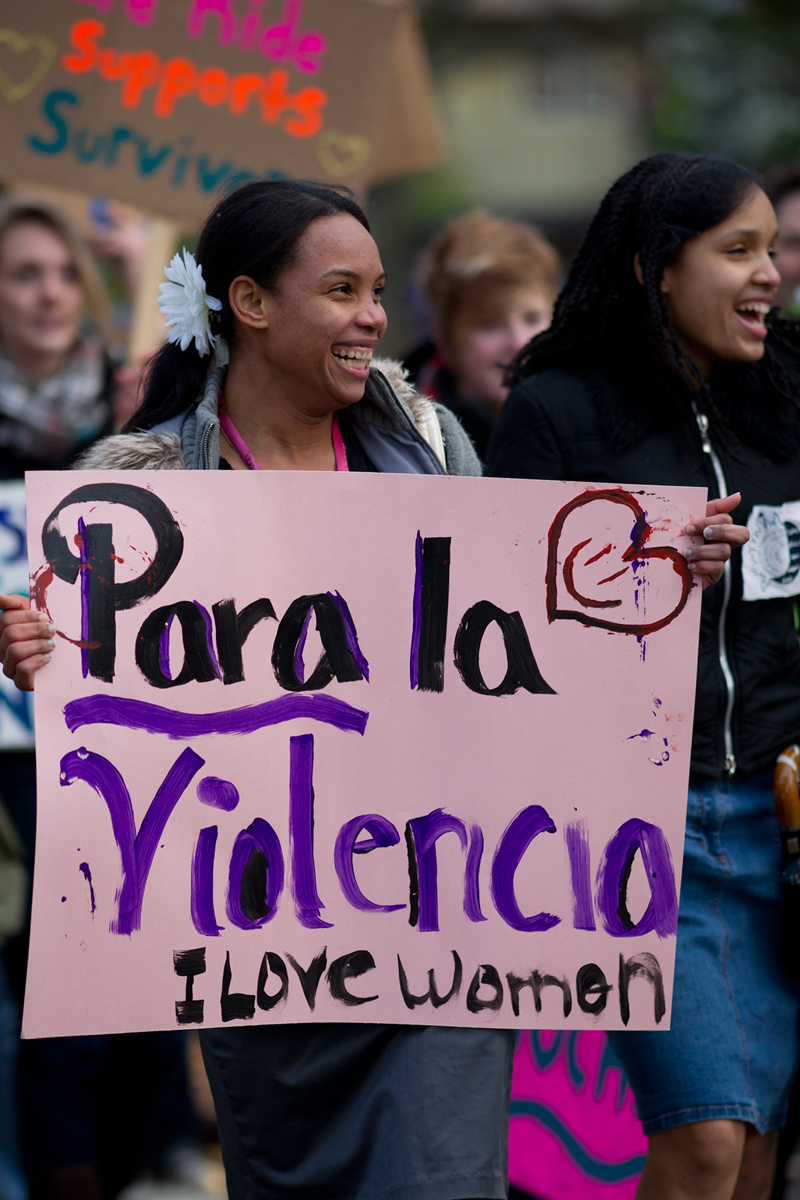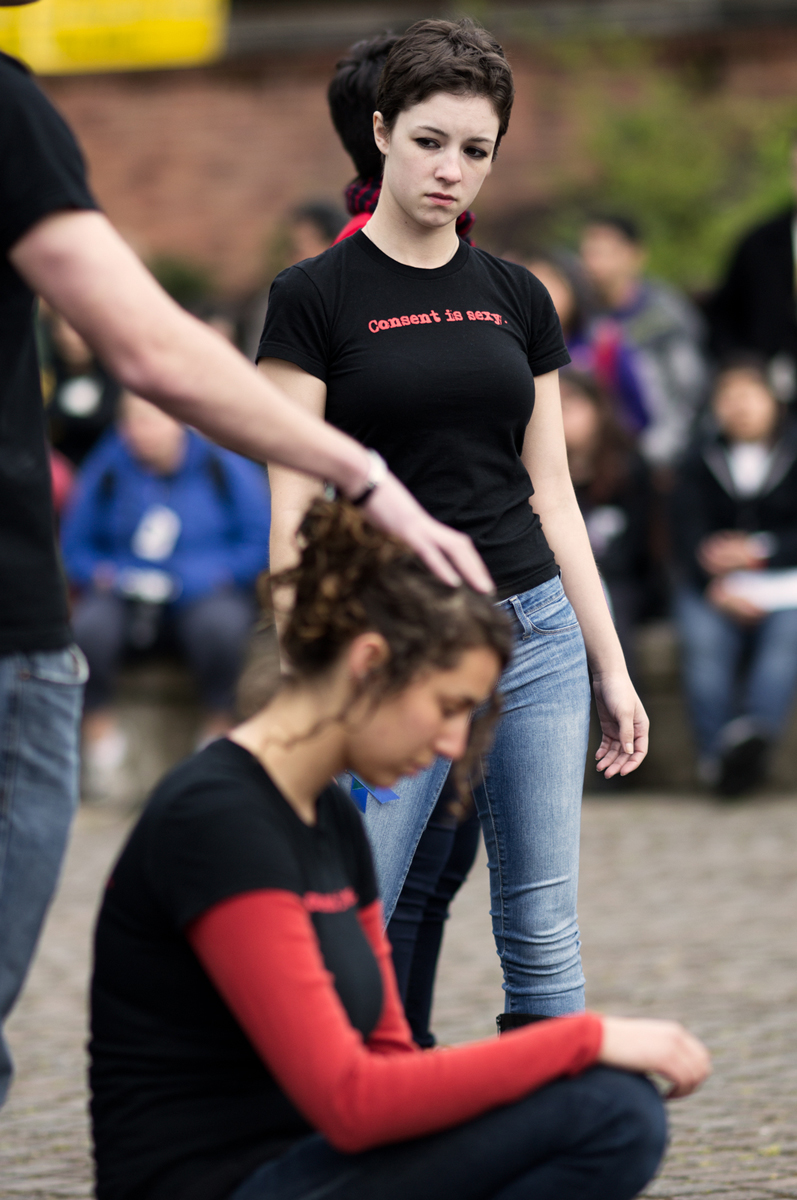Story by Brit McGinnis
Photos by Albert Jung
There is a scene in the 2002 film Spider-Man where Spider-Man is trying to save an obscene amount of people while the Green Goblin looks on and laughs from a point of safety. Then, like magic, cans and garbage start hurling toward the Goblin, followed by shouting from the Queensboro Bridge. Ordinary citizens yell, unafraid of the high-tech villain before them: “I got something for you!”, “You mess with Spidey, you mess with New York!”, and, the most iconic line of all, “You mess with one of us, you mess with all of us!”
Such an inspiring joining of forces prevailed in the air Thursday, April 28, when groups from the University of Oregon and the Eugene community came together for Take Back the Night (TBTN). A national event since 1975 and internationally celebrated since 1976, TBTN is an outcry against sexual assault, a discussion of why this issue reflects many inner problems within American society, and a call to action for a different way of living. But while the University has now put on this event for thirty-two years, 2011 proved to be reflective of a new way of thinking. This year, the ASUO Women’s Center and Sexual Assault Support Services of Eugene (SASS) joined forces with many other groups to rally around the ideas of safety and equality.
Women, men, children, and dogs came together in the Erb Memorial Union ampitheatre, drawn by the pulsing drum beats of the University’s Japanese drumming group Ahiru Daiko. Lane Independent Living Alliance (LILA) and UO Mujeres were among the new groups tabling at the event, but the newest was Be That Guy, a group formed by the Peer Health Internship at the University Health Center. The group was formed only two months ago, in the interest of rallying male students to be supportive in the fight to prevent assault. Macks Wolfard, a UO student and one of the group’s founders, stated passionately, “Men are taught to be strong. Showing emotion and being supportive is [seen as] not manly.” He noted the occasional complaint about TBTN—that it does not often feel accessible to male participants. Wolfard hopes to change all this through Be That Guy. “To have a venue where men are praised for being that guy [who is against sexual violence] shows their masculinity in a strong way, in a positive way.”
Jenny Lor, the sprightly legal advocate for SASS, jumped up from the crowd to welcome the gathering marchers. The Sexual Wellness Advocacy Team (SWAT) performed a lively skit about how to recognize and help prevent sexual assault. Maria Paladino, a longtime member of SASS and admired by many in the program for her commitment to aiding victims of abuse, expressed her joy at seeing so many members of the community come together to combat sexual violence, contending that the epidemic has roots in many societal ills such as classism, racism, and sexism. “This is due to many systemic, institutionalized inequalities. Tonight and from now on, we are strong together.” Paladino’s words were translated into both Spanish and American Sign Language.
Then the march began. Clutching sirens and megaphones, young members of Juventud FACETA rallied the marchers to follow them. Wy’East, a Native American drumming group from Portland, drove the crowd onward from the rear with their loud drums. Many femme details, such as hearts, stars, and the color pink, decorated the protesters. However, they were equally matched with symbols of the reality of sexual violence, such as signs reading “Real Men Don’t Rape” and “No Es Nuestra Culpa” (It’s Not Our Fault). The UO Mujeres epitomized the duality of the participants’ solidarity with assault survivors and the horror of assault, wearing bows in their hair and half-skulls painted down the middle of members’ faces.
Riding on empowerment, the protesters took to the streets of Eugene. Police escorts on motorcycles communicated with the leaders with no problems, only signaling to the protesters to stay out of the EMX bus lanes. Indeed, it seemed like the population of Eugene had come out to give support to the hodgepodge of groups. Wendy Maurer, event coordinator for TBTN, smiled. “When we get to this point [11th Avenue and Alder], it means everything has gone according to plan.” Patrons at the Bier Stein stopped eating and waved vigorously out the window. Apartment dwellers waved pink bras out of windows. Fraternity and sorority windows yelled joyously from stained-glass windows. Maurer glowed at the sight of pedestrians leaving the sidewalk to join the marchers. “It’s always nice to see more people, more allies, every year.”
The march ended at the park area at 8th and Oak Street in downtown Eugene. Food donated by several local businesses was served, while Wy’East performed songs written specially for the event. The evening concluded with an intimate sharing of stories. Any form of recording was forbidden so as to allow the speakers freedom to speak without fear. Lor, the LCC student who had welcomed the same marchers now sat among. Frazzled but smiling, Lor gazed over the crowd that had gathered in the blistering wind. “This is a big opportunity to talk about what people don’t talk about,” she said. “Sexual violence affects all communities, and I think it’s important to have different communities come together.”
SONY DSC









